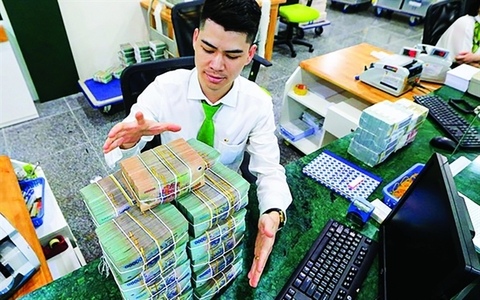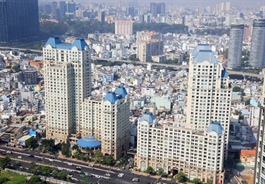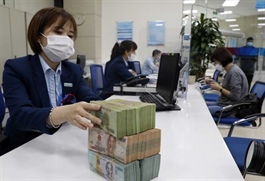Credit growth expected to improve in H2 2023
Credit growth expected to improve in H2 2023
The State Bank of Vietnam (SBV) and relevant ministries are currently implementing a series of solutions with an aim to increase the capital absorption of the economy under the context of low credit growth.

A bank employee counts cash at a transaction office in Ha Noi. Credit institutions have also strictly followed the SBV’s direction to continually reduce lending interest rates. — Photo thoibaonganhang.vn |
According to the SBV, credit reached VND12.3 quadrillion by the end of May, an increase of 3.17 per cent compared to the end of 2022. The rise was much lower than the same period last year.
SBV Governor Nguyen Thi Hong said the main reason for the low credit growth was that firms had no orders and consumption demand declined, so their demand for loans was low.
For loans to the real estate industry, credit growth in this sector was usually higher than the overall growth of the economy. However, the real estate market is facing many difficulties, especially in terms of legality.
To boost credit growth, after the decision to reduce the policy interest rate, the SBV Governor has issued Directive No. 02/CT-NHNN on strengthening credit work and implementing the policy of restructuring the repayment term and maintaining the same debt group to support customers in difficulty as prescribed in Circular 02/2023/TT-NHNN dated April 23, 2023.
Accordingly, besides implementing safe and effective credit growth solutions, improving credit quality, and controlling and handling bad debts, the Governor has requested credit institutions to continually reduce costs to reduce lending interest rates and fees to support firms and individuals to recover and develop production and business.
In addition, the Governor has also requested credit institutions to actively implement credit programmes and policies for a number of industries and fields under the direction of the Government and the Prime Minister, including credit packages worth VND120 trillion for investors and homebuyers of social housing and worker housing projects, renovation and rebuilding projects of old apartment buildings; and the 2 per cent interest rate support programme under Decree 31 2022/ND-CP.
Credit institutions have also strictly followed the SBV’s direction to continually reduce lending interest rates, launch many preferential credit packages for people and businesses, especially in priority areas with large scale from dozen of thousands of Vietnamese dong to hundreds of trillions of dong to stimulate credit demand.
For example, Agribank continues to reduce lending rates by 0.5 percentage points per year for existing medium- and long-term loans of customers until the end of September 30, 2023. It is estimated that about two million customers will be supported under this programme with a reduced amount of more than VND1 trillion. It is Agribank’s fifth rate cut in a row from the beginning of 2023 to directly support customers to help them reduce costs to focus on restructuring and restoring business operations.
LPBank has also implemented a support package to reduce interest rates for individual customers with consumer loans, retail corporate customers, and especially production and business customers with a reduction of up to 1 percentage point per year. This support package, which has a total value of up to VND104 trillion and is applied until the end of August 31 this year, is the largest interest rate support programme that LPBank has implemented to date this year.
Experts forecast when the capital cost is cheaper, firms will seek more capital from banks.
However, according to Nguyen Dinh Tung, general director of OCB, in order to promote economic growth and stimulate credit demand in the current context, it is not possible to rely on a single policy, such as interest rate cuts. Besides the monetary policy, it still needs to promote the fiscal policy as well to help the business community overcome difficulties.
Deputy Prime Minister Le Minh Khai has recently directed the Ministry of Finance to urgently develop a draft decree to reduce 50 per cent of registration fees for domestically manufactured and assembled cars to be applied from July 1 this year. At the same time, the Government has also proposed to continue implementing a policy of reducing VAT by 2 per cent.
In the National Assembly’s agenda recently, many delegates have proposed to consider reducing VAT by 4 per cent to nurture revenue.
Besides, legal issues for real estate projects need to be solved promptly. If the issues are solved early, it will create a driving force for credit growth to recover quickly.
With the smooth and synchronous coordination of the above policies, along with the fact that Viet Nam has been radically reforming administrative procedures and improving the business environment, economist Le Duy Binh believes the economy in the second half of 2023 will have many bright spots and gradually recover, which will help promote the capital absorption of the economy.





















